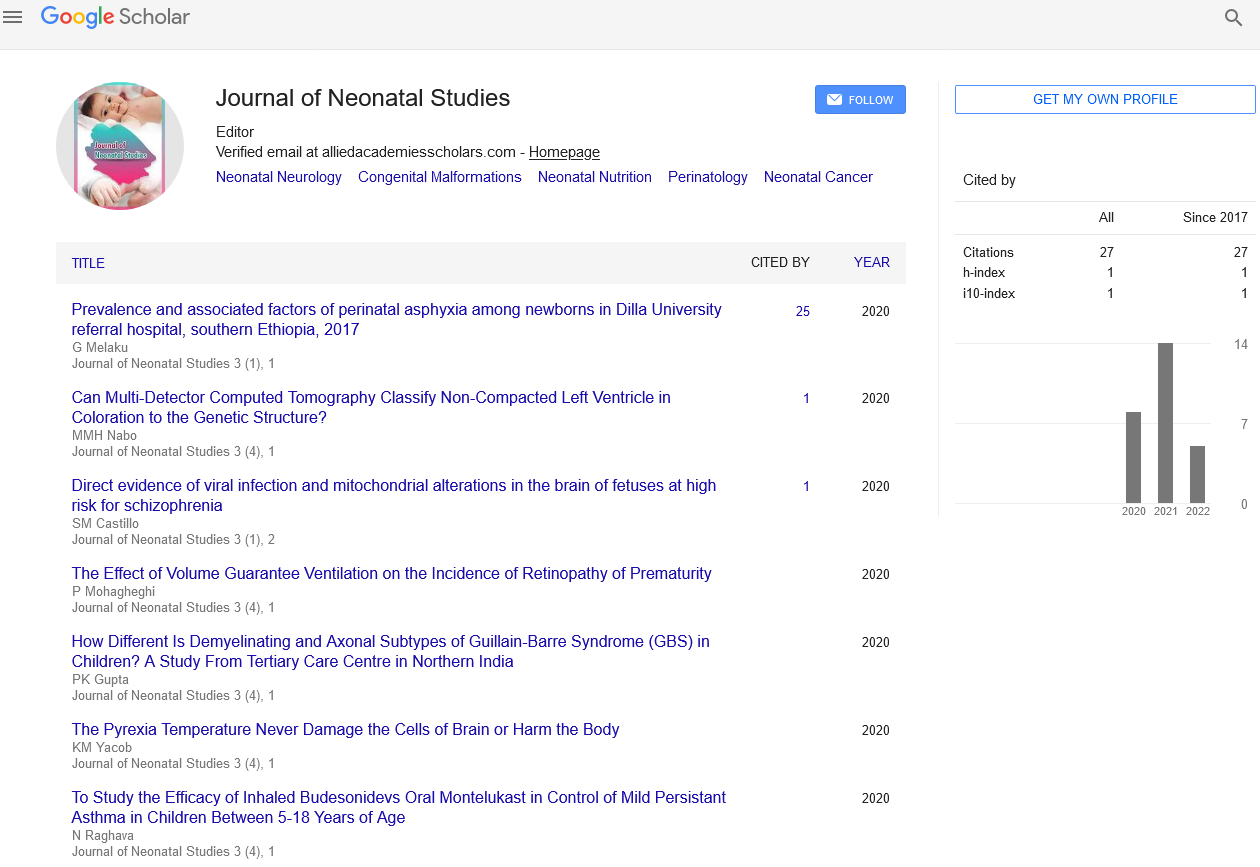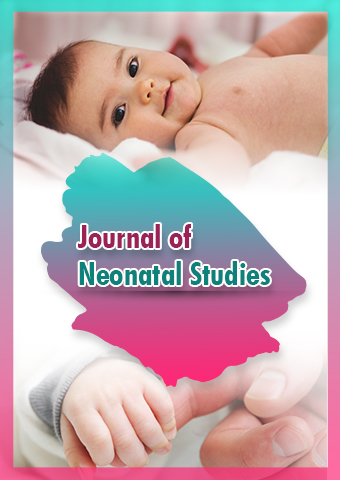Perspective - Journal of Neonatal Studies (2024) Volume 7, Issue 3
Nurturing New Beginnings: Nursing Guidelines for Neonates
- Corresponding Author:
- Glen Hooper
Department of Dermatoloy, Griffith University, Australia
E-mail: hooper.g@qm.qld.gov.au
Received: 17-May-2024, Manuscript No. JNS-24-137933; Editor assigned: 20-May-2024, PreQC No. JNS-24-137933 (PQ); Reviewed: 03-Jun-2024, QC No. JNS-24-137933; Revised: 18-Jun-2024, Manuscript No. JNS-24-137933 (R); Published: 25-Jun-2024, DOI: 10.37532/JNS.2024.7(3).235-237
Introduction
Neonatal nursing is a specialized field dedicated to providing comprehensive care for newborn infants during their initial days of life. This crucial period requires skilled nursing intervention to support the transition from intrauterine to extrauterine life and promote the health and well-being of neonates. In this article, we will explore essential nursing guidelines for neonates, covering various aspects of care, from assessment and monitoring to feeding and developmental support.
Description
Assessment and monitoring
Vital signs: Regular assessment of vital signs, including temperature, heart rate, respiratory rate, and oxygen saturation, is essential in monitoring the neonate’s physiological stability. Any deviations from normal ranges should be promptly addressed to prevent complications.
Skin integrity: Neonatal skin is delicate and prone to injury. Nurses should assess the skin for signs of irritation, breakdown, or infection, especially in areas prone to moisture and friction. Proper skin care practices, including gentle cleansing and moisturizing, can help maintain skin integrity.
Neurological status: Assessment of the neonate’s neurological status, including muscle tone, reflexes, and level of consciousness, provides valuable insights into their neurological development and overall well-being. Any abnormalities should be documented and reported to the healthcare team for further evaluation.
Fluid balance: Monitoring fluid intake and output is crucial in maintaining the neonate’s fluid balance and preventing dehydration or fluid overload. Nurses should assess urine output, measure daily weights, and ensure appropriate fluid administration based on the neonate’s clinical status and fluid needs.
Feeding and nutrition
Bottle feeding: For neonates who are unable to breastfeed or require supplementation, nurses should assist with bottle feeding using appropriate feeding techniques and nipple types. Feeding volumes should be carefully monitored, and feeding intervals adjusted based on the neonate’s feeding tolerance and nutritional requirements.
Enteral nutrition: For neonates requiring enteral feeding, nurses should assess gastric residual volumes, monitor feeding tolerance, and advance feeding volumes and rates gradually to prevent feeding intolerance and aspiration. Close monitoring of electrolytes, glucose levels, and stool output is essential in detecting feeding-related complications.
Parenteral nutrition: Neonates who are unable to tolerate enteral feeds may require parenteral nutrition to meet their nutritional needs. Nurses should ensure proper line placement, monitor infusion rates and volumes, and assess for signs of complications such as line infections or metabolic abnormalities.
Respiratory support and management
Respiratory assessment: Assessment of respiratory status, including respiratory rate, effort, and oxygenation, is critical in identifying respiratory distress or compromise in neonates. Nurses should monitor oxygen saturation continuously and intervene promptly to maintain adequate oxygenation.
Oxygen therapy: Oxygen therapy may be indicated for neonates with respiratory distress, hypoxemia, or cyanosis. Nurses should titrate oxygen therapy carefully to achieve target oxygen saturation levels while minimizing the risk of oxygen toxicity or hyperoxia.
Suctioning: Neonates with excessive secretions or airway obstruction may require suctioning to maintain airway patency. Nurses should use appropriate suctioning techniques and equipment to minimize trauma and maintain mucosal integrity.
Respiratory Distress Syndrome (RDS): Preterm neonates are at risk of developing RDS due to surfactant deficiency. Nurses should monitor for signs of RDS, such as tachypnea, grunting, and retractions, and collaborate with the healthcare team to initiate surfactant replacement therapy and provide respiratory support as needed.
Developmental support
Positioning: Proper positioning is essential in promoting comfort, preventing positional deformities, and supporting developmental milestones in neonates. Nurses should encourage skin-to-skin contact, provide supportive positioning aids, and rotate the neonate’s position regularly to minimize pressure and promote musculoskeletal development.
Environmental enrichment: Creating a supportive and developmentally appropriate environment is crucial in optimizing neonatal outcomes. Nurses should minimize environmental stimuli, provide soothing sensory experiences, and promote opportunities for social interaction and bonding with caregivers.
Developmental care: Neonatal developmental care focuses on optimizing the neonate’s developmental outcomes through individualized, family-centered interventions. Nurses should assess developmental readiness, provide age-appropriate stimulation, and support family involvement in care to promote neurodevelopmental growth and bonding.
Infection prevention and control
Hand hygiene: Hand hygiene is the cornerstone of infection prevention in the neonatal setting. Nurses should perform hand hygiene before and after patient contact, after handling contaminated materials, and before and after invasive procedures to reduce the risk of healthcare-associated infections.
Standard precautions: Standard precautions, including the use of Personal Protective Equipment (PPE) such as gloves, gowns, and masks, are essential in preventing the transmission of infectious agents in the neonatal unit. Nurses should adhere to standard precautions consistently and appropriately based on the neonate’s clinical condition and infection risk.
Isolation precautions: Neonates with suspected or confirmed infectious conditions may require isolation precautions to prevent the spread of infection to other patients and healthcare providers. Nurses should follow facility-specific isolation protocols and implement additional precautions, such as contact or droplet precautions, as indicated.
Family-centered care
Family presence: Encouraging family presence and participation in neonatal care promotes parental involvement, bonding, and empowerment. Nurses should provide opportunities for family members to participate in care activities, decision-making, and skin-to-skin contact to enhance the neonate’s well-being and family satisfaction.
Communication: Effective communication with families is essential in providing holistic and family-centered care for neonates. Nurses should establish open, transparent communication channels, provide clear and consistent information, and address families’ questions, concerns, and preferences in a supportive manner.
Emotional support: Neonatal hospitalization can be stressful and emotionally challenging for families. Nurses should offer empathetic support, validation, and counseling to families experiencing emotional distress, grief, or anxiety. Referral to support services, such as social work, chaplaincy.
Conclusion
Neonatal nursing is a specialized field dedicated to providing comprehensive care for newborn infants during their initial days of life. This crucial period requires skilled nursing intervention to support the transition from intrauterine to extrauterine life and promote the health and well-being of neonates. In this article, we will explore essential nursing guidelines for neonates, covering various aspects of care, from assessment and monitoring to feeding and developmental support.

